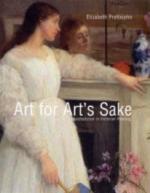|
This section contains 1,062 words (approx. 4 pages at 300 words per page) |

|
Aestheticism
Summary: Examines aestheticism in the Oscar Wilde novel, The Picture of Dorian Gray. Describes how Wilde was widely considered the movement's leader. Provides biographical detail on the author.
London in the 1890's, the setting of The Picture of Dorian Gray, was a time of daring new styles, attitudes and modes of behavior. It has been called fin de siècle, which means "the end of an age" referring to the end of the Victorian values. It was an unsettling and contradictory time that greatly influenced literature. Authors challenged the viewpoints of the Victorian people by addressing gaudy subject matter and amoral values. They did this by having themes including socialism, imperialism, brutal realism and Catholicism. Being unbounded from moral constraints, the authors produced works filled with spirituality, sensuality and love. These works focused on images rather than actual events. Many different people influenced this movement of authors and artists insisting on their right to create from personal conviction and vision, called Aestheticism, but the one person who is widely called its leader is Oscar Wilde.
Oscar...
|
This section contains 1,062 words (approx. 4 pages at 300 words per page) |

|


